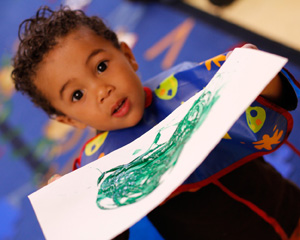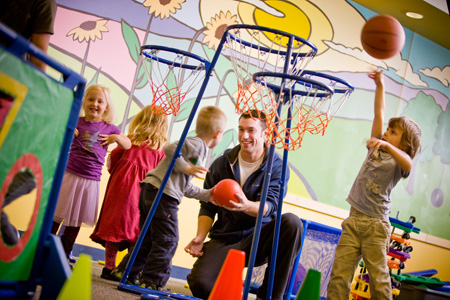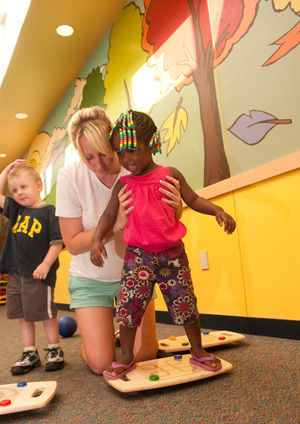SUNY Cortland Child Care Center Reaches Milestone

01/10/2013
The SUNY Cortland Child Care Center’s first clients are now promising young adults — living testaments to the center’s early, and positive influence in their lives.
On Friday, the not-for-profit childcare center quietly marked two decades of helping infants, toddlers and preschoolers develop and learn at Cortland County’s only nationally accredited childcare agency.
The center, which opened on Jan. 11, 1993, has enrolled hundreds of babies and youngsters between the ages of six weeks and five years from Cortland and neighboring counties while providing a living laboratory for generations of the College’s future educators and professionals.
The childcare facility and its current full-time staff of 21 have left an indelible mark on many area children as well as on parents who placed their youngsters at the facility while striving to earn a college degree.
“A number of parents have said to me, I wouldn’t have gotten through college if I hadn’t had my daycare paid for,” said Johanna Hartnett, the center director since 2000. “They said it gave them the ability to change their lives, to go back to school and better themselves. And this also gave their children a good start in life.”
The actual number of children served is elusive, as the center’s total figure of 1,500 enrollments does not indicate whether the same youngster has returned for multiple years, as many have.
“We’ve always remained full with a long waiting list,” Hartnett noted.
 |
| A student worker at the daycare center helps children with their pint-sized basketball game. |
Center staff, who occasionally recognize former clients names on area high school honor rolls, take great pride in meeting an urgent, ongoing local need.
The Child Care Center serves the children of low-income SUNY Cortland students from Cortland, Ithaca, Binghamton or Syracuse. Offspring of faculty and staff are next on the list, followed by the children of recent graduates who are allowed to retain their child’s slot. Finally, community members can seek placements for their children. The center has a contract with the Cortland City School District to offer pre-kindergarten services to as many as 24 four-year-olds at any given time.
However, the center does not just take care of young children, Hartnett said.
“The center also serves as a learning site for students at multiple departments on campus, primarily the Childhood/Early Childhood Education Department,” she said. “We have students complete their first experiences with infants and toddlers as well as their practicum placements with preschoolers here.”
Among the approximately 100 college student placements each year, the day care facility also offers a hands-on learning opportunity for literacy majors who finish their initial observations, physical education classes that study gross motor activities and health interns who try out lessons in beginning health practices with children.
“I think our biggest difference from other area programs is our onsite relationship with the early childhood education program here,” said Hartnett, who also is an adjunct lecturer in the Childhood/Early Childhood Education Department. “The College houses two state-of-the-art classrooms that can tune into the center and watch live classroom activities throughout the day.
“A professor here can use the video as a teaching tool on, say, how to set up a classroom. They might tune in and ask their class, ‘What do you see? Are the children attentive? What’s working? What would you change?’
“There’s a nice, live connection that you don’t have when you’re just using text to teach your class,” Hartnett said. “It’s a nice support. I can watch and see how my students are doing in a classroom, or look at another professor’s students and make suggestions.”
Patricia Clark, wife of SUNY Cortland President Emeritus James M. Clark, was an early and dedicated advocate for the creation of a campus day care center, along with Angela Thurlow, one of the center’s founders and president of the Friends of the SUNY Cortland Child Care Center for eight years.
The red tape and search for money and space on campus to house the center delayed its opening for eight years, Thurlow said.
 |
|
Toddlers worked on their balance and agility with an assistant teacher. |
“It was a hard time to convince people that we had a lot of women who were single parents,” said Thurlow, a retired 51-year SUNY Cortland educator and administrator. During her career, she had met quite a few prospective Cortland students in need of childcare.
“As an academic counselor, I knew of young women who were not able to go to college and became welfare recipients,” Thurlow said. “Having taught young children, and later having children of my own, I knew how important it was not only for a parent to be able to stay in a profession, but for them to raise good children.”
The center opened in the Casey and Smith Towers complex with 20 children in three classrooms, recalled Heather Hurteau, an original teacher. Soon, four rooms were in use.
Once started, the year-round daycare center was immediately in demand among college students with children. Almost from the beginning, the center maintained a waiting list for child placements.
“Later, there were male students who were single parents and, eventually, faculty and staff who needed the service,” Thurlow said. “It was wonderful that we could open up something that was so desperately needed in a college setting.”
Hartnett expanded the program with a fifth room in 2000.
The day care operation moved in 2009 to eight rooms on the ground floor of the College’s newly constructed Education Building at the heart of the campus.
The new space has an adjacent, enclosed, child-friendly playground and dedicated parking lot for parents. The building’s eight classrooms feature two infant rooms, a waddler room for children between infancy and the toddler stage of development, two toddler rooms and three preschool rooms. The facility also has a learning resource room, a parent meeting area, two gross motor spaces, a commercial kitchen and staff respite room.
With the roomier quarters, the center obtained a license to accommodate up to 106 children. It now serves about 35 more infants and toddlers than in its previous location.
During the past six summers, the center has operated a school-age camp licensed for 20 children.
Since 1996, the center has been accredited by the National Association for the Education of Young Children (NAEYC), which sets the criteria used to measure quality practices for the top child care centers in the United States. NAEYC re-accredited the center in 2000, 2003 and 2008 and will evaluate the program for a fifth time in September.
The center’s Board of Directors works to maintain a strong, forward-looking operation. This year, in addition to the challenge of NAEYC re-accreditation, the board’s tasks include developing a plan to maintain fiscal solvency, including the creation of an endowment from private donations; maintaining a staff of experienced, qualified teachers; encouraging staff training and the pursuit of the next level of academic qualification; revising the curriculum and training in a new curriculum guide; and increasing parental involvement in programming.
Funding sources include parental fees based on income eligibility, state subsidies, various grants and the generosity of numerous donors, large and small.
Harnett is concerned that she has seen an erosion of state funding in particular.
“We are perceived as being an elite center with lots and lots of money and that isn’t the case,” said Hartnett, noting that a substantial portion of the funding does not benefit the operation directly beyond enabling more children to attend by offsetting their parents’ fees.
Donations are gladly accepted and the Cortland College Foundation uses naming opportunities at the facility as a creative way to support the center’s children’s programs.
With all the changes, staff members are pleased at what has stayed the same.
“I don’t really think the center has changed much,” observed Kimberlea VanderWoude, an administrative assistant and long-time staff member. “We’ve always catered to the College. We’ve always tried to remain very family-oriented and not school-like. It’s all about their individual needs. I think we’ve managed to keep the program very family-oriented. It’s nice that it still feels homey.”

